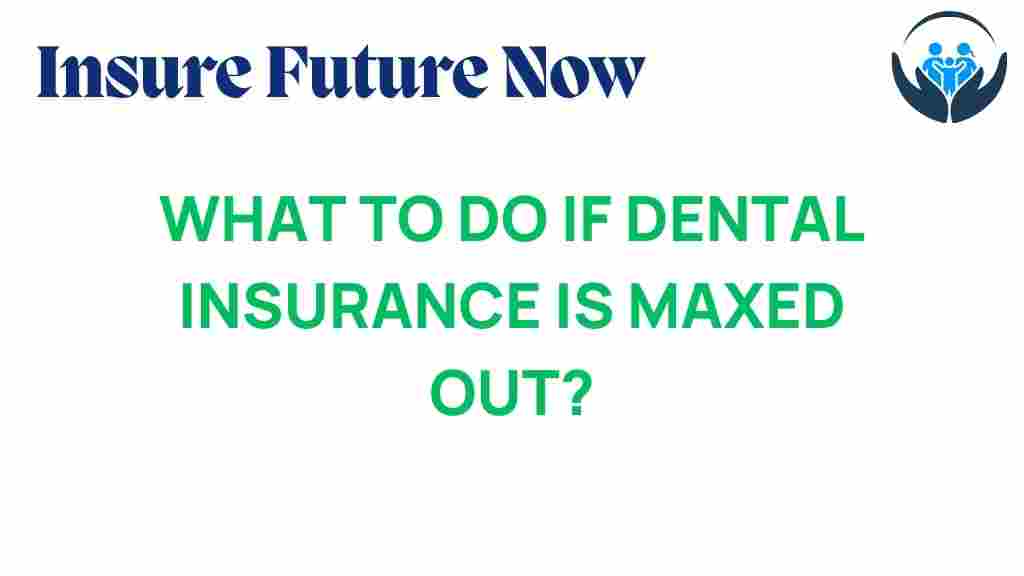What Happens When Your Dental Insurance is Maxed Out?
Dental insurance is designed to help manage the costs of dental care, but what happens when your benefits are maxed out? Understanding the implications of reaching your coverage limits can help you navigate the tricky waters of dental care costs effectively. In this article, we will explore the consequences of maxed out benefits, offer practical insurance tips, and provide strategies for maintaining your oral health without breaking the bank.
The Basics of Dental Insurance
Before diving into what happens when your dental insurance is maxed out, let’s first discuss the fundamentals of dental insurance. Typically, dental insurance plans cover a range of services including:
- Preventive care (cleanings, exams, X-rays)
- Basic restorative services (fillings, extractions)
- Major restorative work (crowns, bridges, dentures)
- Orthodontics (braces, retainers)
Each of these categories has its own coverage limits, which are crucial to understand as you manage your policy. Most dental plans have an annual maximum benefit, often ranging from $1,000 to $2,500. Once you reach this limit, you are responsible for all additional dental care costs until your plan resets for the new year.
What Happens When Your Dental Insurance is Maxed Out?
When your dental insurance is maxed out, several consequences can arise:
1. Increased Out-of-Pocket Expenses
The most immediate impact of maxing out your benefits is the increase in out-of-pocket expenses. Without insurance coverage, you will have to pay for any necessary dental procedures entirely out of pocket. This can be particularly burdensome if you require extensive dental work.
2. Delayed Dental Treatments
If your insurance is maxed out, you may find yourself postponing necessary treatments or procedures due to cost. This can lead to worsening dental health issues, resulting in more complex and expensive treatments down the line.
3. Limited Access to Specialized Care
Many insurance policies have specific limits on what types of care are covered. Once you’ve maxed out your basic benefits, you may find it difficult to access specialized care, such as root canals or periodontal treatments, which could be necessary for maintaining your oral health.
Managing Your Policy and Benefits
To prevent exceeding your dental insurance limits, effective policy management is key. Here are some tips to help you keep your dental care costs under control:
1. Understand Your Coverage Limits
Familiarize yourself with your dental insurance policy. Know the specific coverage limits for preventive, basic, and major services. This knowledge will help you plan your dental care more effectively throughout the year.
2. Prioritize Preventive Care
Preventive care is often fully covered by dental insurance. Regular check-ups and cleanings can help catch problems before they escalate into more costly procedures. Make sure to schedule these appointments regularly to maximize your benefits.
3. Plan Major Treatments Wisely
If you anticipate needing major dental work, consider scheduling these procedures strategically. You may want to spread them across different policy years to optimize your insurance benefits.
4. Utilize Flexible Spending Accounts (FSAs)
If your employer offers a Flexible Spending Account, consider contributing to it. FSAs allow you to set aside pre-tax dollars for medical expenses, including dental costs, which can ease the financial burden when your benefits are maxed out.
Patient Strategies for Managing Dental Care Costs
When dental insurance benefits are maxed out, it’s essential to employ patient strategies to manage dental care costs effectively:
1. Seek Dental Schools for Affordable Care
Dental schools often offer services at a significantly reduced rate. Students, under the supervision of experienced faculty, can provide necessary treatments while you save on costs.
2. Negotiate Payment Plans with Your Dentist
Many dental offices offer payment plans or sliding scale fees based on income. Don’t hesitate to discuss your financial situation with your dentist to find a manageable payment solution.
3. Explore Discount Dental Plans
If your insurance is maxed out, consider enrolling in a discount dental plan. These plans provide reduced fees for dental services and can be a cost-effective way to access care.
4. Keep an Eye on Annual Maximums
Track your dental expenses throughout the year. Keeping a record can help you avoid unexpected costs and remind you of how much benefit you have left. You can often check your benefits online through your insurance provider’s website.
Troubleshooting When Benefits Are Exhausted
If you find yourself in a situation where your dental insurance benefits are exhausted, consider the following troubleshooting tips:
1. Review Your Policy for Unused Benefits
Sometimes, you may have unused benefits that can be applied to upcoming treatments. Review your policy details carefully to ensure you’re not missing out on any coverage you still have available.
2. Look for Alternative Coverage Options
If you anticipate needing more dental care than your current plan allows, consider switching to a plan with higher coverage limits or more comprehensive benefits during the next enrollment period.
3. Stay Informed About Changes in Coverage
Insurance plans can change from year to year. Stay informed about any changes to your coverage limits or benefits by reviewing your policy documents and contacting your insurance provider for clarification.
Conclusion
When your dental insurance is maxed out, the impact on your oral health and finances can be significant. Understanding your coverage limits and being proactive about managing your policy is essential for maintaining your dental health. By prioritizing preventive care, planning major treatments wisely, and employing strategies to handle costs effectively, you can navigate the challenges of maxed out benefits. Remember, your oral health is important, and there are ways to manage dental care costs without sacrificing quality care.
For more information on maintaining your oral health and finding affordable dental options, consider visiting this resource. Additionally, you can learn about various dental insurance plans and their coverage limits through this link.
This article is in the category Tips and created by InsureFutureNow Team
